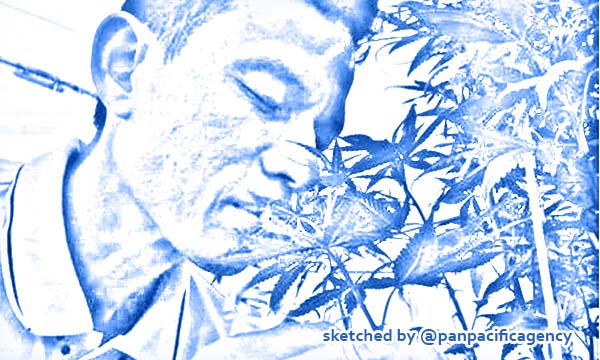[Analytics] Can medical cannabis in Thailand balance profits and patients?

A Thai man sniffs marijuana plants at the Cannabis Expo in Buriram province, Thailand, April 19, 2019. Photo: Facebook. Sketched by the Pan Pacific Agency.
For the past four years, the Thai government has been making legislative reforms to build a market for medical cannabis. With the potential to reap significant economic benefits and help patients in need, the question remains — will the government prioritise profits or patients? Pascal Tanguay specially for the East Asia Forum.
Although those two objectives are not necessarily mutually exclusive, it is important to understand the motivations behind the reforms so that policymakers can balance both aspects. Evidence increasingly shows that health is a public good that is too important to be managed by market forces, especially given that profiteering is at odds with public health principles.
In January 2017, hemp (fibre from the cannabis plant stem) was decriminalised in a pilot project by Thailand’s Narcotics Control Board. In December 2018, Thailand’s National Assembly unanimously voted for amending national laws in favour of medical cannabis. In February 2019, cannabis and hemp extracts were removed from state control and products containing hemp were reclassified in August 2019.
Additional reforms a year later allowed private medical operators to grow and trade the crops. In December 2020, authorities removed additional parts of the cannabis plant from criminal statutes. In March 2021, Deputy Prime Minister and Public Health Minister Anutin Charnvirakul announced that households could legally grow up to six cannabis plants.
Medical cannabis is in high demand from patients suffering from 38 different health conditions. Three months before the plant became legal, over 30,000 people registered for access and a further one million patients became eligible for use. Although only a few dozen individuals were initially in therapy due to major challenges in approving patients, 10,000 bottles of cannabis oil were distributed among patients with a prescription in August 2019. By November 2020, 14,236 patients were receiving medical cannabis, representing a modest increase in accessibility.
Stringent government controls have led to licensing challenges. In January 2020, 442 medical cannabis licenses had been issued, over 400 of which were used for distribution — although supply remains an important challenge to be addressed by household production.
Infrastructural challenges to facilitate access have been partially addressed through the rapid expansion of dispensing clinics. By November 2020, 311 medical clinics were operating, most in Bangkok, although the government has committed to having at least one in each province. This is up from two full-time clinics in May 2019. Despite the growing number of clinics, it remains unclear how many patients currently have access to medical cannabis in the absence of any evaluation of dispensing medical services.
The government has been explicit that the primary impetus behind its medical cannabis policies is profit. Deputy Prime Minister Charnvirakul stated that ‘marijuana and hemp are both economic crops [that provide] a new option for locals to generate revenue’. He went on to claim that ‘households could earn 12,000 baht (US$385) per year by selling plants to industry’. Marut Jirasrattasiri, Director General of the Department of Thai Traditional and Alternative Medicine, referred to medical cannabis as providing ‘more options for income’.
The press echoes the promise of financial benefits, with many articles advancing potential economic gains published in the health section rather than the business section. The market value of cannabis in Thailand is estimated to be between US$660 million and US$2.5 billion by 2024. It is no wonder that multiple segments of society are keen on chasing the ‘pot of gold’ and joining the green rush.
Yet some worry that the promise of profit will lead to corners being cut and skewed priorities. Putting profit ahead of public health is a common response to public health crises — one most recently seen in the context of the COVID-19 pandemic. Experts warn that prioritising commercial interests over public health may lead to ‘negative and irreversible consequences for Thai society’.
In Thailand, the medical needs of patients and the potential health benefits of cannabis seem to be secondary to the potential economic returns from growing the market. If patients came before profit, we would have seen a rapid increase in patient access and independent efforts to identify bottlenecks and improve accessibility. Experts and officials would be promoting the medical benefits of cannabis. Instead, access to cannabis has been limited, no evaluations have been performed and popular discourse promotes the potential economic benefits for the country, the government, and the business sector.
Thailand has historically done well in protecting patients over profiteering by issuing compulsory licenses to ensure affordable access to essential medicines. It is important that the government upholds those same priorities as it positions itself as a leader in the Southeast Asian medical cannabis market.
Pascal Tanguay is an independent harm reduction and drug policy expert based in Bangkok.